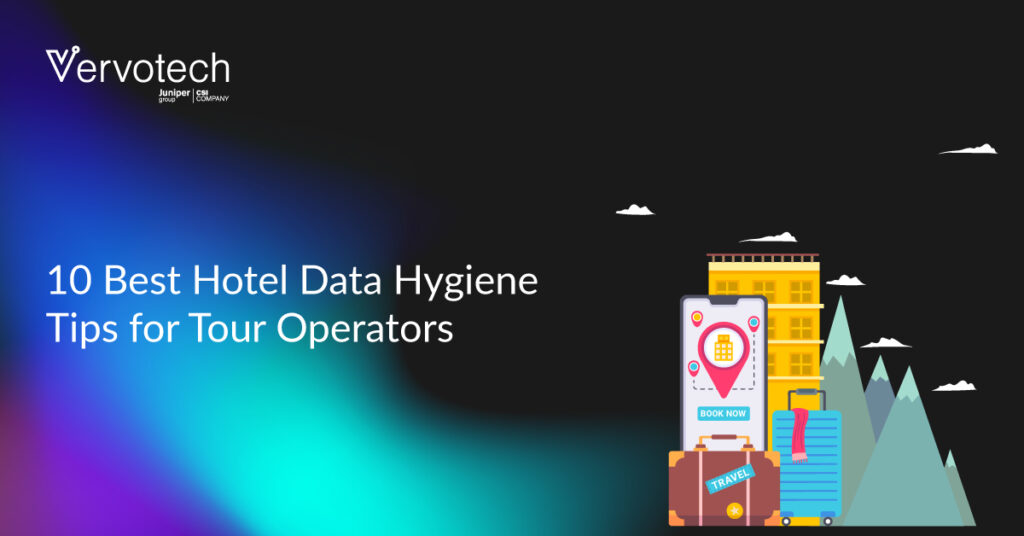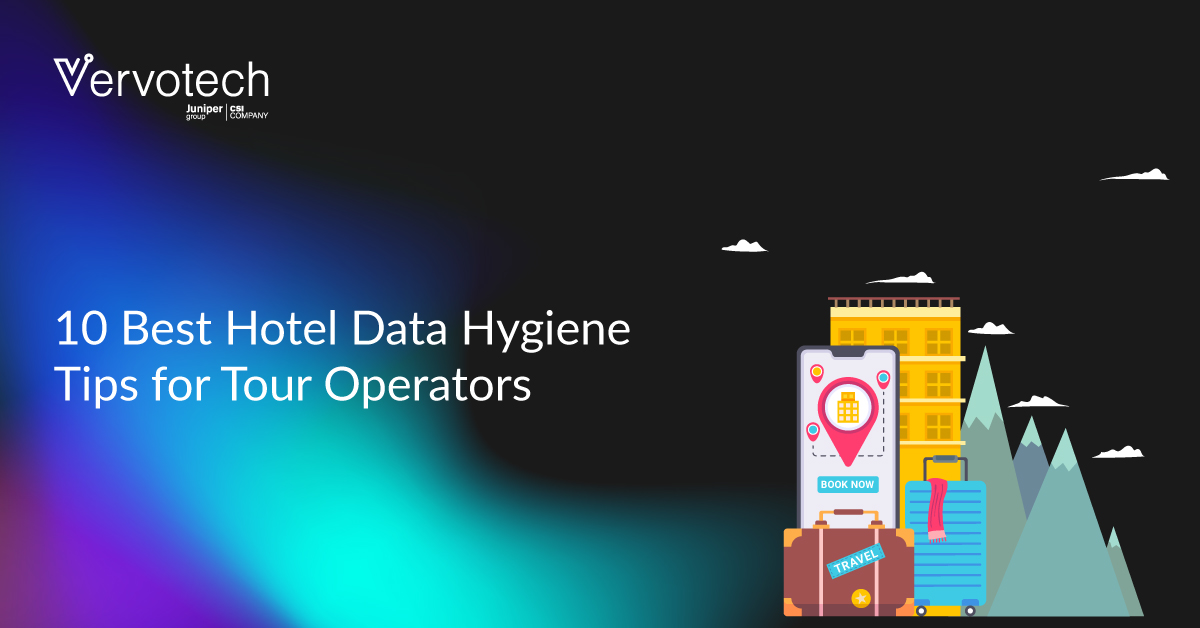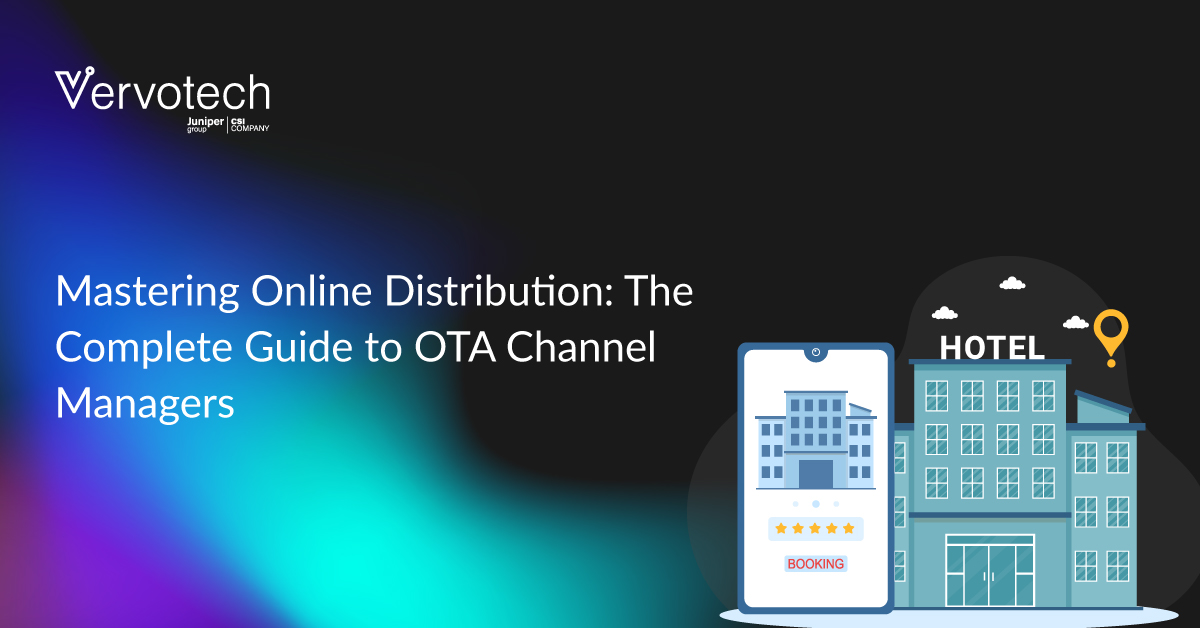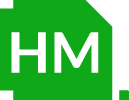The travel industry lives and breathes data. For tour operators or tour management companies (TMCs) managing extensive hotel inventories across multiple suppliers, the quality of data directly impacts how smoothly their business runs. Clean, consistent, and accurate data ensures that travelers see the right property details, the correct room types, and the best rates every time.
In contrast, poor hotel data hygiene leads to duplicate listings, mismatched rooms, outdated amenities, and, ultimately, an unreliable booking experience. In an industry built on trust and speed, that’s a cost few tour operators can afford.
To help you maintain a high‑performing and dependable hotel data ecosystem, we’ve compiled 10 best actionable hotel data hygiene practices to build a future‑ready travel business. But why are we talking about hotel data hygiene? Let’s brush up on that.
What Does Hotel Data Hygiene Even Mean?
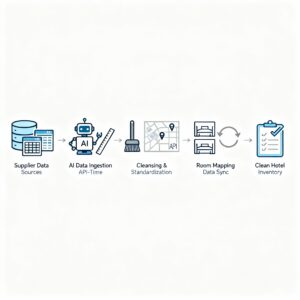
Hotel data hygiene refers to the ongoing process of cleaning, standardizing, validating, and enriching hotel-related data to ensure it is accurate, consistent, and reliable across systems. This data includes hotel names, addresses, geocodes, room descriptions, amenities, images, and other attributes that travelers depend on to make informed booking decisions.
For tour operators, maintaining strong data hygiene ensures that every hotel shown to customers is real, updated, and accurately represented. It minimizes manual reconciliation, reduces customer disputes, and enhances the overall efficiency of operations.
Why Hotel Data Hygiene Matters More Than Ever
Hotel data quality directly influences visibility, trust, and profitability. Clean hotel data powers accurate pricing, faster search results, and better personalization. Conversely, poor data erodes consumer trust and causes costly booking errors. Imagine two listings for the same property with different room prices or descriptions- confusion is inevitable. This can lead to booking overlaps, poor customer experiences, and lost revenue. Good data hygiene helps tour companies maintain an edge in a market where travelers expect instant, accurate, and trustworthy information. Now, let’s dive into the best data hygiene tips that we’ve compiled for you.
The Ten Best Hotel Data Hygiene Tips for Tour Management Companies (TMCs)
Strong hotel data hygiene supports every part of your business- from better supplier management to smoother customer experiences. These ten best practices will help Tour Management Companies strengthen their data infrastructure and unlock better performance across all suppliers:
#1 Conduct Regular Hotel Data Audits
Hotels frequently undergo rebranding, close, change affiliations, or relocate. If such updates aren’t reflected in your database, customers may encounter outdated listings that don’t match real-world conditions. To avoid such issues, you must run quality data audits every now and then to ensure that every property in your system remains active, correctly identified, and accurately described.
You CAN do this manually, but it isn’t scalable when managing tens of thousands of hotels. This is why you should set up a periodic data audit process that automatically archives or removes old or inactive entries. Implement rule-based scripts or data validation tools to check for anomalies in fields like geocodes, property names, hotel names, contact details, and room attributes.
Automated validation systems quickly flag missing fields, inconsistent formats, or outdated information before they reach your live environment. It even ensures that your datasets remain lightweight, relevant, and easy to search, while also lowering storage and processing overheads. Regularly auditing your hotel data will help you set a benchmark for your ongoing data quality metrics. Use verified data sources or Hotel Mapping APIs to cross-check entries.
#2 Standardize Your Data Collection Process
Strong hotel data hygiene begins with consistency in how data is collected and recorded. Hotel data comes from multiple wholesalers, bedbanks, and direct contracts, each with its own naming conventions and content styles. Without standardization, “Marriott Downtown” from one source and “The Marriott City Center” from another can be treated as two different hotels.
To prevent this, develop a standardized data schema that defines required fields for hotel names, addresses, geocodes, star ratings, and amenities. Implement clear naming conventions so that “Wi-Fi,” “Free WiFi,” and “Wireless Internet” are recognized as one attribute. Establishing data rules early ensures every hotel record follows the same structure, paving the way for seamless data integration later.
Also Read: Why Is Hotel Data Standardization Important for Travel Businesses?
#3 Eliminate Duplicate Hotel Entries
Duplicate listings are one of the most common data hygiene issues for tour operators. When the same property appears multiple times with slightly different details, it leads to operational inefficiency, inaccurate pricing, and confusion for travelers. These duplicates often arise when multiple suppliers provide data for the same hotels using different naming conventions or IDs.
Maintaining hotel data across multiple sources can quickly become chaotic without a centralized system. Which is why an easier workaround is to integrate a hotel mapping API. It can automatically detect and merge duplicates across suppliers. Such APIs match hotels using key identifiers like names, geocodes, and addresses, to unify data under one consistent entry. Removing duplicates not only saves system space but also enhances accuracy, helping travelers find the right hotel faster.
Look for a robust hotel mapping API that ensures your entire ecosystem operates from a single source of truth, reduces manual reconciliation, saves time, and creates a scalable foundation for data-driven growth.
#4 Maintain Location Accuracy
Geocodes are crucial to helping customers locate hotels accurately. Inaccurate coordinates or incomplete addresses can place hotels miles away from their actual locations on your platform, leading to customer complaints and poor user experience. For tour operators managing global inventories, even small geocode errors can have large-scale implications.
Ensure each hotel in your database includes verified latitude and longitude coordinates and a standardized address format. Periodically cross-check this information using reliable mapping tools or APIs. High-quality geolocation data improves search relevance, enhances map-based filtering, and boosts traveler confidence when booking properties in unfamiliar destinations.
#5 Keep Room‑Level Data Consistent
Hotel room data hygiene is equally important. Inconsistent hotel room data often becomes a source of confusion as different suppliers often describe identical room types differently. One might list it as “Deluxe Sea View,” while others call it “Ocean View Deluxe.” Without proper mapping, this creates redundant listings and pricing discrepancies.
A Room Mapping API intelligently identifies similar rooms across all sources and groups them under a single, accurate representation. It aligns naming conventions, amenities, and descriptions to create a unified catalog. This not only improves conversion rates but also helps you maintain confidence in the accuracy of your listings.
Also Read: How to Choose the Best Room Mapping API: Features and Benefits
#6 Keep Visual Content Updated
Images and videos are vital to hotel marketing, but they can easily become outdated when properties are renovated or rebranded. Outdated visuals misrepresent the hotel, leading to mistrust and lower booking conversions. Maintaining visual data hygiene is just as important as textual accuracy.
Create a structured review schedule for all hotel images, ideally every six to twelve months. Work with suppliers or hotel partners to obtain new images that reflect current conditions. Implement tools that detect low-quality, duplicate, or mismatched visuals. Updated imagery helps travelers make informed choices and positions your platform as trustworthy and professional.
#7 Enforce Strong Data Governance Practices
Good data hygiene isn’t a one‑time fix; it’s a continuous discipline supported by policies, controls, and ownership. Define clear governance protocols for who manages, updates, and validates your data.
Ensure compliance with privacy and security standards such as GDPR and CCPA to protect both your customers and partners. Reliable data governance ensures long‑term scalability and consistency as your business evolves.
#8 Monitor Data Source Performance
Not all data suppliers maintain the same quality standards. Some deliver accurate and timely updates, while others provide incomplete or inconsistent data feeds. Monitoring supplier performance ensures that poor-quality data doesn’t seep into your core systems.
Develop a supplier performance matrix that measures key metrics such as data completeness, error rates, update frequency, and responsiveness. Share feedback regularly with suppliers to encourage improvement.
Monitoring these KPIs will help you identify problem areas and measure ROI from your data hygiene initiatives. Over time, you’ll see direct correlations between higher data quality, reduced refund rates, and improved customer satisfaction.
#9 Enrich Hotel Data with Verified Attributes
Beyond accuracy, hotel data should also be informative and engaging. Enriched data, such as verified ratings, nearby attractions, or sustainability credentials, adds value for travelers and helps your listings stand out. It transforms raw information into actionable insights that enhance discoverability and relevance.
Partner with trusted data providers to integrate verified attributes into your listings. Include details like proximity to landmarks, accessibility options, and traveler reviews. A rich, verified dataset not only improves SEO and personalization but also increases customer satisfaction by offering travelers a complete and accurate view of each property.
#10 Establish a Continuous Feedback Loop Between Teams
Hotel data hygiene isn’t just a one-time cleanup; it’s an ongoing process that depends on collaboration across multiple teams. The product, operations, technology, and customer support teams each handle hotel data in different stages, and without a feedback mechanism, critical issues can go unnoticed.
Create a structured feedback loop where customer-facing teams regularly share data-related issues, such as incorrect room details, outdated amenities, or mismatched locations, with the data management or product teams. Encourage suppliers to participate in this loop by promptly reporting discrepancies.
Use analytics and error logs to identify recurring data quality problems and address their root causes instead of treating them as isolated incidents. Continuous communication ensures errors are corrected faster; lessons are shared across teams, and your overall data hygiene strategy keeps evolving.
Final Thoughts and Next Steps
Hotel data hygiene is the key to operational efficiency, better customer experiences, and stronger revenue performance. Being a tour operator, if you invest in data hygiene, you’ll stand out with seamless listings, fewer booking discrepancies, and higher traveler trust.
If your team is ready to streamline hotel data management, start by evaluating how clean and unified your current inventory really is. Run an internal audit, list your top data challenges, and identify where automation could simplify your processes.
To make the next step easier, explore how Vervotech’s Hotel Mapping API and Room Mapping API can help your business.
Schedule a quick demo or connect with a Vervotech solutions expert to see their Hotel Mapping & Room Mapping APIs in action. Begin your journey toward cleaner, smarter, and more reliable hotel data and give your customers the experience they expect.

